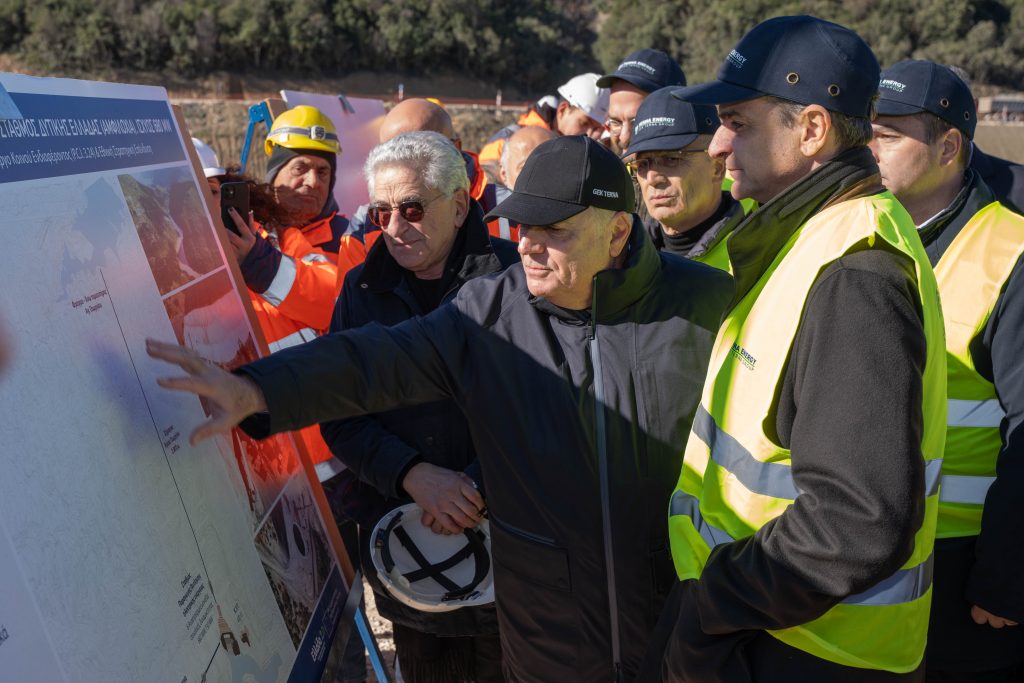Corporate News
Investment of 650 million euros, 1,000 new jobs during construction, and overall benefits to the electrical system exceeding €120 million annually

“The Pumped Storage System in Amfilochia”, the largest project for the production and storage of clean energy using the pumped storage method in our country, was visited today by Prime Minister Mr. Kyriakos Mitsotakis. During the visit, he had the opportunity to observe the progress of the construction works, which already employ around 400 people.
The project constitutes the largest investment in energy storage in Greece, with a total amount of 650 million euros, upgrading the domestic energy system and the energy mix of Greece. Specifically, the inclusion of the Amfilochia pumped storage contributes to overall benefits to the electrical system exceeding €120 million annually, as tt is expected to play a crucial role in ensuring the country’s energy efficiency, reducing dependence on imported fuels, enhancing flexibility and stability of the interconnected electrical grid facilitating further penetration of renewable sources, and compressing overall electricity cost.
Furthermore, among the key advantages of implementing this specific project are the creation of 1,000 new jobs during construction and the retention of 60 jobs during operation for specialized and supporting staff. The project also involves the utilization of domestic resources, with approximately 70% of the project representing high domestic added value. Additionally, it leads to the consequent improvement of local infrastructure and an increase in the region’s visitation.
This is a pivotal project that has already been designated as a Project of Common European Interest (PCI 3.24) since 2013 and as a Strategic Investment of Significance since 2014. The project studies were co-financed by the Connecting Europe Facility program, while a portion of the overall cost (250 million euros) is funded through the Recovery and Resilience Fund (RRF).
Energy storage, along with electrical interconnections, constitute the fundamental pillars supporting the process of energy transition towards climate neutrality, especially in light of the widespread integration of fluctuating renewable energy production into energy systems.
With a total installed capacity of 680 MW (generation) and 730 MW (pumping/storage), the project includes two independent upper reservoirs (Agios Georgios and Pyrgos) with a total capacity of 9 million cubic meters. Additionally, the existing Kastraki Lake is utilized as the lower reservoir.
The operation of pump storage requires two reservoirs at different elevations, i.e., a geomorphological characteristic that our country abundantly possesses. When there is excess energy in the system, this energy is used to pump water from the “lower” to the “upper” reservoir. When there is high demand in the system, the water returns to the lower reservoir, generating hydroelectric energy. In this simple way, the “surplus” energy is temporarily stored to be converted into hydroelectric energy when the system requires it.
Pumped storage is the most tested method, representing 97% of global energy storage. The first pumped storage projects appeared as early as 1890 to manage loads for large thermal base units. They have significant comparative advantages over other energy storage methods (such as imported batteries), as they offer the capability of massive storage, much lower costs, high domestic added value, and a long lifespan exceeding 50 years.
Accompanying the Prime Minister, Mr. Kyriakos Mitsotakis, at the construction site in Amfilochia, the President and CEO of the GEK TERNA Group, Mr. George Peristeris, noted that this investment marks the entry into a new era for the renewable energy sector in Greece. The country is now looking towards harnessing its natural resources for storing large quantities of electrical energy for longer duration which exceeds 10 hours. “After 10 years of planning, studies, and comprehensive checks at both Greek and European levels, Greece is now ready to realize its vision of producing and storing large-scale clean energy. This involves leveraging its water potential and unique geomorphology. The energy autonomy of our country must be a priority. We must fully exploit domestic energy sources, secure our national electrical system, and, of course, take advantage of connections, infrastructure, and energy sources from other countries for the benefit of our nation. We are proud to invest in and implement a project with a high degree of domestic added value that will provide hundreds of jobs, contribute to the development of local communities, and, of course, strengthen the domestic electrical system, allowing for further penetration of domestic, clean, and affordable energy into Greece’s energy mix. TERNA ENERGY once again reaffirms its role as the largest Greek renewable energy company, taking the lead with new investments and setting even higher goals for the future.”